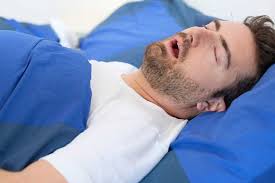Recently I was tested for sleep apnea. Being severely depressed like myself creates changes and disturbances to sleep. I’d go bed tired and wanting to sleep. But I couldn’t fall asleep. My mind kept me awake until 3 or 4 in the morning, before exhaustion would let me finally doze off for a couple of hours. The lack of sleep caused mood swings, physical and mental tiredness, and even pains and aches in joints. I never suspected sleep apnea. Nor did I know that about 46 percent of people with sleep apnea have depression.
Does sleep apnea cause depression?
Depression is caused by many things. But no, sleep apnea doesn’t cause depression.
Sleep apnea is a serious sleep disorder. Obstructive sleep apnea is the most common type. When your throat muscles relax, they obstruct the back of your throat and your airway. Sometimes your tongue slides a bit into the back of your mouth and it too obstructs proper breathing. If you snore, you probably have sleep apnea. Snoring is the body’s way of trying to get the tissue off the back of your throat so you can breathe.
Sleep apnea affects mood.
Sleep apnea affects your mood. Because your airway is blocked, there’s less oxygen going to your brain and body. Your heart rate also increases as your body gets stressed out about not getting oxygen. So there’s an increase in adrenaline shooting throughout your body. Once you snore, and get the passageway cleared, your body returns to normal. Each time your air passageway is blocked, your body endures a lack of oxygen and a sudden adrenaline rush. This cycle is havoc for your mood.
Disturbing your sleep cycle means you don’t get to stay long, if at all, in REM sleep. REM sleep is the deepest sleep your brain and body go into. It’s a time of renewal. Your body energizes itself for the upcoming day. The mind stores memories. Without proper REM sleep, all that is gone. Learning becomes difficult, and memory is foggy. Energy level is low. There’s also a chance of high blood pressure, diabetes, and heart problems.
Common signs of sleep apnea.
How do you know if you have sleep apnea? After all, you probably don’t remember if you snore at night or not. I didn’t know I snored, until I took the apnea test. So here’s a list of common symptoms of sleep apnea. Ask your partner if you have any of these symptoms. Or, have a recorder on while you sleep.
Snoring.
Silent pauses in breathing. You might not be holding your breath during those silent times.
Waking because you’re choking or gasping.
Fatigue or napping lots during the day.
Feeling unrefreshed after sleeping for hours.
Morning headaches. Sore throat, neck, or shoulder.
Difficulty concentrating during the day.
Irritability, low mood, mood swings, or depression.
Sleep apnea is easily treatable. But it can be costly. If you’re depressed and have sleep apnea, the depression won’t be cured because you treat the apnea. You might feel better because your body is energized and well rested. But it’s still important to stay on any antidepressants.
Visit me on Twitter @tereziafarkas


